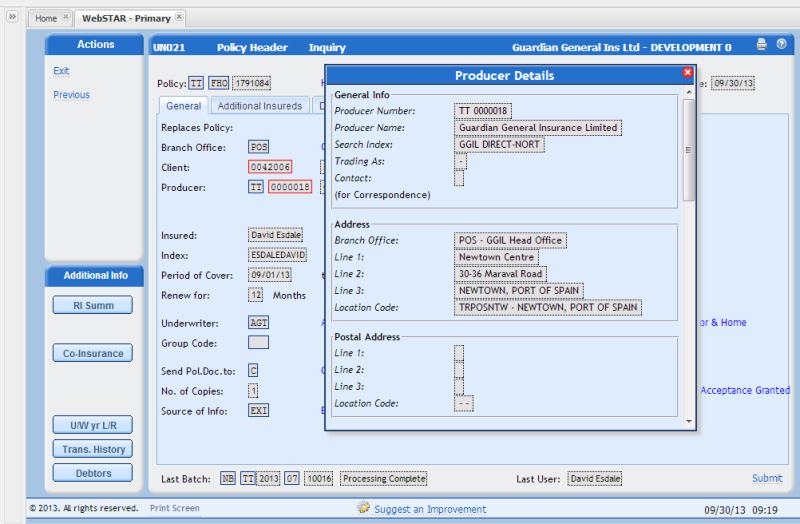The Challenge
Guardian General utilizes a core administration system that was first developed for the IBM i in the 1990s. Today, it supports over 650 business users in 17 countries. In addition to giving users access to applications that help customers with their individual insurance needs, the system also supports back-office processes like claims management, billing and collection, business intelligence, document management and workload management.
The philosophy of Guardian’s IT team has been to revise and improve this system over time, as opposed to developing standalone applications. “We integrate new requirements into the core application instead of building separate applications,” explains David Esdale, Application System Consultant at Guardian General. “This ensures that all coding follows consistent standards, while simplifying design changes.”
However, these improvements and design changes couldn’t address a major challenge: an outdated 5250 user interface. The system’s green screen interface not only made it difficult to train new employees on the applications, it made it difficult to find new RPG developers who were willing to work with the system. It also created a hurdle when granting access to remote users. In order to provide Guardian General with the best tools available on the IBM i platform, Esdale and his team knew that they needed to go to the root of their problem and find a way to futurize their applications.
Rewriting or replacing it with another system mistakenly viewed by some as ‘more modern’ would have been risky and very expensive.
David Esdale
Application System Consultant, Guardian GeneralThe Solution
One path – migrating away from the IBM i platform altogether – wasn’t an option for Esdale. He realized the potential of the platform, and over the years he and his team of seven developers continuously improved upon it, including a conversion to modern RPG IV free format programming. “We wanted to continue to use our proven and powerful system which meets the needs of the organization,” he states. “Rewriting or replacing it with another system mistakenly viewed by some as ‘more modern’ would have been risky and very expensive.”
The solution needed to help the team create the modern, web browser-based applications preferred by their users while supporting the continued development and maintenance of applications on the IBM i. The solution also needed to be easy for RPG developers to learn and use, as his team had limited Web development knowledge.
Esdale and his team agreed to start with refaced, or “Web-enabled”, applications to kick-start their efforts while they solidified their overall modernization plan. They began evaluating 3rd party modernization solutions, some of which were very expensive and didn’t allow Esdale to download and try the software himself, while others lacked a robust designer and required the team to learn HTML.
Then Esdale’s team evaluated Genie from Profound Logic. Genie, now a key component of the Profound AppDev suite, is a refacing solution that enables developers to create on-the-fly web versions of their 5250 applications. As part of the integrated Profound AppDev environment, Genie seamlessly works with other components like Profound UI, which ensures the ability to add more robust futurization at a later date.
“We were quite happy with Genie as it enabled us to move to a web interface quickly,” explains Esdale. “We have also used Genie as a method for our existing programmers to transition to web development.”

When the Guardian General team was ready to take the next step and create modern applications without 5250, they found that Profound UI, another component of the Profound AppDev suite, was a perfect fit. Profound UI utilizes RPG Open Access, the IBM i feature that lets programmers move their RPG applications away from the 5250 stream and onto the Web. This capability, plus an intuitive graphical development environment, made developing modern applications very easy for Esdale’s developers.
“After taking the time to plan the next phase of futurization and enhancements we wanted to make to our applications, we were ready to get started with Profound UI,” Esdale says. “Transitioning from Genie to Profound UI was very easy and allowed us to futurize the system quickly and then enhance the user experience when we were ready. Within a few months of development and testing, we had cut the ties to 5250 and created a truly modern application environment.”
The Results
Guardian General successfully rolled out their futurized core system (rebranded as ‘WebSTAR’) within months of using Profound UI, and the response from both business and technical users has been overwhelmingly positive.
“Prior to futurizing, our developers and end users felt like they were working on an old platform,” said Esdale. “Now recruiting technical staff is much easier, and the time it takes to train new employees on applications has been cut by at least 20%.”
Not only is the new web-based interface more intuitive to business users, Esdale’s team has made significant feature improvements to the original applications.
“Now that we’re not restricted to 24×80, we have more space to be creative with how users interact with the application,” he explains. “We’ve reduced the number of screens in our applications by using tab panels, added graphs and maps, included a notes panel where users can add information to a record, and integrated the whole package with Atrium (part of the Profound AppDev suite) to create a centralized navigation system. Users can work with the WebSTAR system as they would any Windows-type application, which makes them much more efficient. And many of them have no idea that they’re using an application that runs on the IBM i!”
Now recruiting technical staff is much easier, and the time it takes to train new employees on applications has been cut by at least 20%
David Esdale
Application System Consultant, Guardian GeneralThe Coexistence Approach
Today, Guardian General leverages multiple components from the integrated Profound AppDev suite to address futurization, web services, and centralized, role-based navigation. Profound AppDev suite’s components—Profound UI, Genie, and Atrium—work together harmoniously to enable a coexistence strategy, where legacy and modern applications work seamlessly together. This integrated approach has not only enabled Esdale’s team to make improvements to WebSTAR now but also to plan future enhancements, such as mobile applications and API integrations.
Guardian General’s success demonstrates the power of Profound AppDev’s coexistence approach, allowing organizations to futurize at their own pace while preserving their valuable existing investments in IBM i technology.
The Challenge
Guardian General utilizes a core administration system that was first developed for the IBM i in the 1990s. Today, it supports over 650 business users in 17 countries. In addition to giving users access to applications that help customers with their individual insurance needs, the system also supports back-office processes like claims management, billing and collection, business intelligence, document management and workload management.
The philosophy of Guardian’s IT team has been to revise and improve this system over time, as opposed to developing standalone applications. “We integrate new requirements into the core application instead of building separate applications,” explains David Esdale, Application System Consultant at Guardian General. “This ensures that all coding follows consistent standards, while simplifying design changes.”
However, these improvements and design changes couldn’t address a major challenge: an outdated 5250 user interface. The system’s green screen interface not only made it difficult to train new employees on the applications, it made it difficult to find new RPG developers who were willing to work with the system. It also created a hurdle when granting access to remote users. In order to provide Guardian General with the best tools available on the IBM I platform, Esdale and his team knew that they needed to go to the root of their problem and find a way to modernize their applications.
“Rewriting or replacing it with another system mistakenly viewed by some as ‘more modern’ would have been risky and very expensive.”
David Esdale
Application System Consultant, Guardian General
The Solution
One modernization path – migrating away from the IBM i platform altogether – wasn’t an option for Esdale. He realized the potential of the platform, and over the years he and his team of seven developers continuously improved upon it, including a conversion to modern RPG IV free format programming. “We wanted to continue to use our proven and powerful system which meets the needs
of the organization,” he states. “Rewriting or replacing it with another system mistakenly viewed by some as ‘more modern’ would have been risky and very expensive.”
The solution, therefore, needed to help the team create the modern, web browser-based applications preferred by their users while supporting the continued development and maintenance of applications on the IBM i. The solution also needed to be easy for RPG developers to learn and use, as his team had limited Web development knowledge.
Esdale and his team agreed to start with refaced, or “Webenabled”, applications to kick-start their efforts while they solidified their overall modernization plan. They began evaluating 3rd party modernization solutions, some of which were very expensive and didn’t allow Esdale to download and try the software himself, while others lacked a robust designer and required the team to learn HTML. Then Esdale’s team evaluated Genie from Profound Software. Genie is a refacing solution that enables developers to create on-the-fly web versions of their 5250 applications. Genie seamlessly integrates with Profound Logic’s Profound UI suite of modernization solutions, which ensures the ability to add more robust modernization at a later date.
“We were quite happy with Genie as it enabled us to move to a web interface quickly,” explains Esdale. “We have also used Genie as a method for our existing programmers to transition to web development.”

Guardian General’s new web-enabled WebSTAR application.
When the Guardian General team was ready to take the next step and create modern applications without 5250, they found that Profound UI was a perfect fit. Profound UI utilizes RPG Open Access, the IBM i feature that lets programmers move their RPG applications away from the 5250 stream and onto the Web. This capability, plus an intuitive graphical development environment, made developing modern applications very easy for Esdale’s developers.
“After taking the time to plan the next phase of modernization and enhancements we wanted to make
to our applications, we were ready to get started with Profound UI,” Esdale says. “Transitioning from Genie to Profound UI was very easy and allowed us to modernize the system quickly and then enhance the user experience when we were ready. Within a few months of development and testing, we had cut the ties to 5250 and created a truly modern application environment.”
The Results
Guardian General successfully rolled out their modernized core system (rebranded as ‘WebSTAR’) within months of using Profound UI, and the response from both business and technical users has been overwhelmingly positive.
“Prior to modernizing, our developers and end users felt like they were working on an old platform,” said Esdale. “Now recruiting technical staff is much easier, and the time it takes to train new employees on applications has been cut by at least 20%.”
Not only is the new web-based interface more intuitive to business users, Esdale’s team has made significant feature improvements to the original applications.
“Now that we’re not restricted to 24×80, we have more space to be creative with how users interact with the application,” he explains. “We’ve reduced the number of screens in our applications by using tab panels, added graphs and maps, included a notes panel where users can add information to
a record, and integrated the whole package with Profound Logic’s Atrium tool to create a centralized navigation system. Users can work with the WebSTAR system as they would any Windows-type application, which makes them much more efficient. And many of them have no idea that they’re using an application that runs on the IBM i!”
Today, Guardian General uses a combination of Profound Logic tools to address modernization, web services and centralized, role-based navigation: Profound UI, Genie, RPGsp and Atrium. These integrated tools enable Esdale’s team to not only make improvements to WebSTAR now, but to plan future enhancements, such as mobile applications.
“Now recruiting technical staff is much easier, and the time it takes to train new employees on applications has been cut by at least 20%.”
David Esdale
Application System Consultant, Guardian General




















